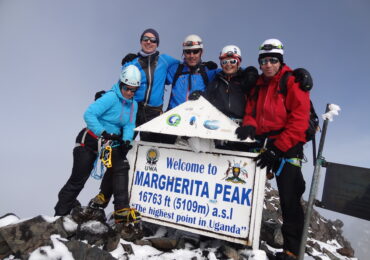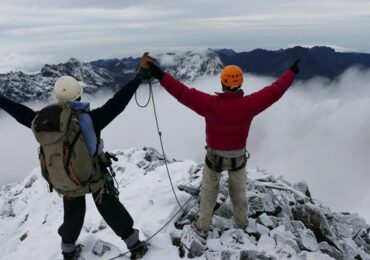- 2
- 5
- 7
- 5
- 1
- 2
- 1
- 1
- 2
- 1
- 1
- 3
- 3
- 4
- 2
- 2
- 4
- 4
Rwenzori Mountains

 A Lost World Hidden in the Clouds
A Lost World Hidden in the Clouds
Deep in western Uganda, rising dramatically along the border with the Democratic Republic of Congo, the Rwenzori Mountains stretch into the sky like something out of legend. Known as the “Mountains of the Moon”, this UNESCO World Heritage Site offers one of the most surreal and soul-stirring landscapes in Africa. Unlike the bare volcanic peaks of Kilimanjaro or Mount Kenya, the Rwenzoris are wild, lush, and mysterious—a land of mist-shrouded valleys, glacial lakes, waterfalls, and towering peaks cloaked in moss and lichen.
At the heart of the park stands Mount Stanley, Africa’s third-highest mountain, capped with snow and ice, even as it straddles the equator. For trekkers, this is the ultimate high-altitude challenge—multi-day hikes that pass through five distinct ecological zones, from tropical rainforest to alpine meadows, boggy heathlands, and icy summits. It’s raw, remote, and deeply rewarding.
A Biodiversity Hotspot Like No Other
The Rwenzoris are not only visually breathtaking—they are biologically extraordinary. The park is home to rare plant life found nowhere else on Earth, like giant lobelias, everlasting flowers, and groundsel trees that create a prehistoric feel along the higher slopes. Colobus monkeys leap through the canopy, while Rwenzori turacos flash crimson wings between the trees. In the lower montane forest, lucky trekkers may spot chimpanzees, forest elephants, and even leopards.
The mountain range is a critical water catchment for the region, feeding rivers and supporting agriculture for communities below. Protecting the Rwenzoris means safeguarding climate resilience, biodiversity, and cultural identity for generations to come.
Mountain People, Mountain Culture
Beyond its natural wonders, Rwenzori Mountains National Park is also a place of deep cultural heritage. The indigenous Bakonzo people, who have lived on these slopes for centuries, are spiritual custodians of the land. Their stories, ceremonies, and livelihoods are tied closely to the rhythm of the mountains. Through community-led experiences, travelers can engage with Bakonzo elders, traditional healers, local farmers, and artists—sharing songs, crafts, foods, and sustainable practices that reflect a life lived in harmony with nature.
Tourism here provides not just adventure—but impact. Local porters, guides, cooks, and cultural hosts benefit directly from every trek. Revenue supports education, reforestation, and the preservation of both nature and tradition. When you hike the Rwenzoris, you’re not only ascending one of Africa’s great ranges—you’re helping to uplift the people who call it home.
A Journey Into Another World
The Rwenzori Mountains don’t just challenge your body—they stir your soul. They demand patience, reward endurance, and open your eyes to an Africa few ever see. In a world chasing fast travel and familiar paths, the Rwenzoris offer something rare: a sacred, slow adventure into mystery, beauty, and meaning.
For the conscious traveler, the trekker, the dreamer, and the nature lover—Rwenzori Mountains National Park is not to be missed.
